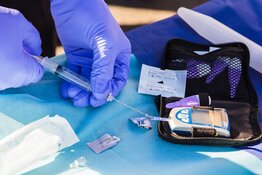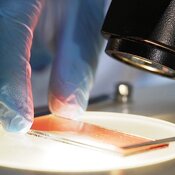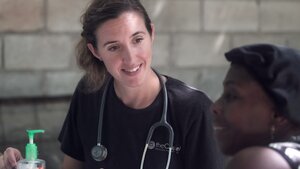Femasys Inc.'s (FEMY:NASDAQ) FemaSeed tubal insemination device led to "impressive pregnancy rates in women with male factor infertility," according to newly published pivotal trial results, H.C. Wainwright & Co. analyst Emily Bodnar reported in a Nov. 26 research note. FemaSeed delivers washed sperm directly into the fallopian tube.
"The data demonstrate positive experiences with FemaSeed in a historically difficult subgroup of couples with infertility which have low success with intrauterine insemination," Bodnar wrote. "We view FemaSeed as a potentially preferred infertility solution in subjects with male factor infertility."
Target Reflects 990% Gain
The stock of this Georgia, U.S.-based medical device firm offers investors a potential return of 990%, noted Bodnar. This is derived from H.C. Wainwright's $12 per share price target on the company and its current share price of about $1.10.
Femasys remains a Buy.
Recap of Trial Design
Bodnar described this single-arm, historical control study, conducted at 12 academic and private medical centers in the U.S. Participants were females with male factor or unexplained infertility and a very low total motile sperm count, between 1 and 20 million (1–20M). The women were between 19 and 40 years of age, 32 on average. Of the 113 participants, 38% had prior intrauterine insemination, and 85% had received controlled ovarian stimulation and human chorionic gonadotropin injection. The mean infertility years among subjects was 3.6.
Sperm preparation was split 50%/50% between wash-and-centrifugation and density gradient.
Patients were given intratubal insemination using FemaSeed, in a minimally invasive, nonsurgical procedure averaging 7.24 minutes. It was done in a doctor's office without anesthesia. Bodnar noted the efficiency and convenience of the FemaSeed procedure.
Efficacy Exceeds Target
Bodnar presented the efficacy and safety highlights of the FemaSeed pivotal trial results, reporting they were published in the recent Journal of Gynecology & Reproductive Medicine issue.
"This publication could be utilized to support marketing and commercial efforts of FemaSeed to infertility clinics and to consumers directly," added Bodnar.
Using the catheter-based FemaSeed device, the pregnancy rate exceeded the company's 7% goal based on historical control of intrauterine insemination during 1,115 cycles. With FemaSeed, 26% of patients, or 10 out of 38, got pregnant. Per cycle, 17.5% of patients, or 10 out of 57, conceived.
The conception rate on the first intratubal insemination cycle was 60%. Eighty percent of participants received ovarian stimulation.
The cumulative pregnancy rate through the first cycle was 15.8% and through the second cycle, 30.7%.
Among women with single female factor and normal total motile sperm count higher than 20M, the pregnancy rate was 13.3%, or in 2 subjects out of 15. The overall pregnancy rate among all 133 participants was not stated in the article.
FemaSeed exhibited a favorable safety profile with low rates of adverse events occurring with the procedure, reported Bodnar. Results showed safety to be consistent with that of intrauterine insemination. Out of 222 FemaSeed pregnancies, only one was ectopic, a rate of 0.5%. Uterine perforation did not happen at all.
Site Visit Takeaways
Also in her report, Bodnar gave her impressions from a Nov. 25 visit to Femasys' 41,000-square-foot manufacturing facility in Georgia. She reported the company has streamlined its manufacturing processes to achieve better quality and improved gross margins. Now Femasys can manufacture products at the level needed for clinical trials and commercial sales and can do so quicker and more efficiently because all of its products are similarly designed.
Currently, Femasys is growing its FemaSeed inventory to meet initial demand. It, too, is fulfilling orders for its infertility clinic partners, such as Boston IVF in Massachusetts.
More Orders, Partnerships Expected
With marketing efforts ramping up and understanding of FemaSeed increasing, Femasys and H.C. Wainwright expect sales of both FemaSeed and FemVue, the biomedical firm's Fallopian tube ultrasound test, to grow and additional partnerships to come to fruition.
Femasys is marketing its existing product FemVue as a companion diagnostic tool to FemaSeed, a solid strategy, noted Bodnar, given many clinics already use FemVue and are familiar with the company and its products.
As such, H.C. Wainwright expects a boost in FemVue sales due to joint marketing with FemaSeed and increased marketing of the intratubal insemination device.
Femasys is expected to start direct-to-consumer marketing of FemaSeed in 2025. This could "drive additional demand for the product, which is the only new innovation for infertility in decades," Bodnar wrote.
H.C. Wainwright forecasts Femasys will generate $1.2 million ($1.2M) from FemaSeed sales this year, increasing next year. Already in 2024, in Q3/24, following product launch, sales totaled about $0.3M, exceeding H.C. Wainwright's estimate of $0.13M.
| Want to be the first to know about interesting Medical Devices investment ideas? Sign up to receive the FREE Streetwise Reports' newsletter. | Subscribe |










































